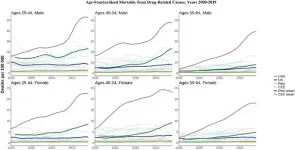(Press-News.org) LA JOLLA, CA—Neuroscientists at Scripps Research have found that inhibiting neurons involved in the body’s stress response may reduce alcohol consumption in people who have both post-traumatic stress disorder (PTSD) and alcohol use disorder (AUD)—even if they still experience trauma-related anxiety.
The findings were published March 21 in Molecular Psychiatry. These discoveries are helping untangle the complex role that stress and trauma play in neurological disorders like PTSD and AUD, while also informing the development of new treatment options for people who experience both these conditions simultaneously.
“Traumatic experiences in life can increase vulnerability to alcohol drinking and exacerbate symptoms of depression and anxiety,” says senior author Marisa Roberto, PhD, the Schimmel Family Endowed Chair and vice chair of the Department of Molecular Medicine. “Alcohol is often used as a coping strategy to blur trauma-associated memories and diminish negative emotional states.”
PTSD and AUD are often comorbid, so understanding their underlying neurological mechanisms in tandem is crucial. About 6% of the U.S. population will develop PTSD at some point, according to the U.S. Department of Veterans Affairs, and people with PTSD have a 30% lifetime prevalence of AUD. However, few pharmaceutical therapies exist to treat the disorders together.
Roberto’s team previously created a model in which rats develop symptoms similar to what people with comorbid PTSD and AUD experience: aggression, anxiety, hyperarousal, disturbed sleep and increased alcohol consumption. In this new study, they compared these rats with those that did not exhibit anxiety-like behaviors by giving each group access to both alcohol and water.
Compared with unstressed rats, those that were stressed exhibited higher levels of peripheral stress hormones, and various genes in the central amygdala, including one that encodes for the neuropeptide known as corticotropin-releasing factor (CRF), were also shown to be altered in stressed rats.
CRF exists in the central amygdala, a part of the brain that’s altered by excessive drinking and is responsible for processing fear. Stress causes neural release of CRF, which plays a key role in regulating physiological responses to the emotion. Prior research with rats has shown that inhibiting neurons that express CRF reduces alcohol consumption.
After identifying that the stressed rats expressed higher levels of CRF in the amygdala, the researchers then inhibited CRF-producing neurons in the stressed group. As expected, they found that this decreased alcohol consumption—but it didn’t mitigate anxiety as they initially thought it would.
“We were surprised to see that the anxiety phenotypes were not reduced when silencing CRF expressing neurons in the central amygdala, suggesting other neuropeptide co-factors might be at play,” says the study’s first author, Bryan Cruz, PhD, a postdoctoral fellow at Scripps Research.
The results suggest that CRF plays a role in alcohol use among those with comorbid PTSD and AUD. Still, the researchers conclude that future studies need to disentangle the neurological mechanisms behind stress-related alcohol consumption and trauma-induced anxiety.
“Understanding the neurobiology of PTSD-AUD is key for development of future intervention strategies for this devastating comorbidity,” says Roberto. “We speculate that other neuropeptides with anti-stress properties may be involved in PTSD-AUD.”
This work and the researchers involved were supported by funding from the National Institute on Alcohol Abuse and Alcoholism (grants AA027700, AA013498, P60 AA006420, AA017447, AA021491, AA029841, AA028879, AA029498, K99 AA026638, K99 AA030609, T32 AA007456, and AA02675) and the Schimmel Family Chair and Pearson Center for Alcoholism and Addiction Research.
In addition to Cruz and Roberto, authors of the study, “Chemogenetic inhibition of central amygdala CRF-expressing neurons decreases alcohol intake but not trauma-related behaviors in a rat model of post-traumatic stress and alcohol use disorder,” are Valentina Vozella, Vittoria Borgonetti, Ryan Bullard, Paula C. Bianchi, Luisa B. Bertotto, Michal Bajo, Roman Vlkolinsky, and Eric P. Zorrilla of Scripps Research; Dean Kirson of The University of Tennessee Health Science Center; and Robert O. Messing of The University of Texas at Austin.
END
How neural inhibition could reduce alcohol use
A Scripps Research team shows that suppressing the activity of certain stress neurons may decrease alcohol use—but not anxiety—in comorbid cases of post-traumatic stress disorder and alcohol use disorder
2024-03-21
ELSE PRESS RELEASES FROM THIS DATE:
The Lancet: Dramatic declines in global fertility rates set to transform global population patterns by 2100
2024-03-21
Embargoed access to the paper and contact details for authors are available in Notes to Editors at the end of the release.
By 2050, over three-quarters (155 of 204) of countries will not have high enough fertility rates to sustain population size over time; this will increase to 97% of countries (198 of 204) by 2100.
Pronounced shifts in patterns of livebirths are also predicted, with the share of the world’s live births nearly doubling in low-income regions from 18% in 2021 to 35% in 2100; and sub-Saharan Africa accounting for one in every two children born on the planet by 2100.
In low-income settings with higher fertility rates, better access to contraceptives and female education ...
NHS needs 32 billion cash injection to recover shortfall and help tackle current crisis
2024-03-21
The NHS needs an immediate cash injection of around £8.5bn a year over the next four years to make up a £32bn shortfall in funding and help tackle the current crisis, especially in areas such as waiting times, access to primary care, workforce and capital investment, say experts in the second report of The BMJ Commission on the Future of the NHS.
John Appleby and colleagues argue that, while the government’s recent spring budget funding pledges are a start, they “certainly will not make up the significant shortfall that the NHS ...
Many publicly accessible AI assistants lack adequate safeguards to prevent mass health disinformation
2024-03-21
Effective processes for reporting and responding to safeguard vulnerabilities are also lacking, warn experts
Many publicly accessible artificial intelligence (AI) assistants lack adequate safeguards to consistently prevent the mass generation of health disinformation across a broad range of topics, warn experts in The BMJ today.
They call for enhanced regulation, transparency, and routine auditing to help prevent advanced AI assistants from contributing to the generation of health disinformation.
Large language models (LLMs) are a form of generative AI that have the potential to greatly improve many aspects of society, including ...
New study highlights troubling trends in midlife mortality in the US and UK
2024-03-21
A new study by researchers at the Leverhulme Centre for Demographic Science (LCDS) and Princeton University reveals that US working-age adults are dying at higher rates than their peers in high-income countries; the UK is also falling behind. The study is published today in the International Journal of Epidemiology.
Using annual mortality data from the World Health Organization Mortality Database, the study compared trends in midlife mortality for adults aged 25-64 years between 1990 and 2019 across 15 major causes of death in 18 high-income countries, ...
Nudging the public’s thirst for draught alcohol-free beers could significantly reduce alcohol-associated harms, new study finds
2024-03-21
Making alcohol-free beer more widely available on draught in pubs and bars may help people switch from alcoholic to alcohol-free beer, a new study published in Addiction today [21 March], has found. Pubs and bars taking part in the University of Bristol-led trial saw an increase in sales of healthier non-alcoholic draught beer.
In partnership with Bristol City Council (BCC), researchers from the University’s Tobacco and Alcohol Research Group (TARG) recruited 14 pubs and bars across the city that were willing to change the drinks that they offered on draught for a limited period. Previous research by the same group, using an online experiment as a proxy for real-world behaviour, ...
Millions are at risk using high arsenic water for cooking
2024-03-21
Around 32 per cent of the world's population live in countries that do not adhere to the World Health Organisation’s recommendations on safe limits of arsenic in drinking water
Rice is already known to contain more inorganic arsenic than other cereals
Cooking rice with water containing more than 10 µg L-1 (parts per billion) inorganic arsenic amplifies the risk of arsenic exposure
Long-term exposure to inorganic arsenic in water can cause serious health problems such as cancers, diabetes and pulmonary and cardiovascular diseases
Rice is one of the major cereal crops ...
TLI investigator Dr. Nicholas Jenzjowsky receives NIH/NIAID grant to investigate the neural regulation of asthma
2024-03-21
In a significant stride for respiratory medicine, Lundquist Institute (TLI) investigator Nicholas Jendzjowsky, PhD, has been awarded a prestigious grant from the National Institute of Health/National Institute of Allergy and Infectious Diseases (NIH/NIAID). This grant, totaling $298,800, not only underscores TLI's commitment to pioneering research and excellence in respiratory medicine and exercise physiology but also recognizes Dr. Jendzjowsky's expertise and the importance of his research.
The ...
Doctors’ pay in England has declined by 25% since 2008
2024-03-21
Doctors’ pay in England has declined by 25% since 2008
Independent analysis shows doctors’ salary erosion far outstrips other UK workers
Doctors describe how they struggle to afford everyday essentials
Trainee eye surgeon quit after worry over gas bill
As doctors in England enter their 13th month of industrial action, an independent analysis of their pay confirms that the real terms value of their salaries has declined by a quarter in the 15 years since their pay was frozen.
The analysis – conducted for The BMJ by the Office of Health Economics (OHE), an independent health economics research organisation – found that across ...
NIH grant funds research on work-related asthma among nurses
2024-03-21
A researcher at the University of Arizona Mel and Enid Zuckerman College of Public Health received a $750,000 National Institutes of Health grant to study the asthma risks associated with the use of cleaning and disinfecting products among nurses.
Cleaning processes in health care facilities involve an inherent “risk-risk tradeoff.” Increased use of cleaning and disinfection products leads to increased work-related asthma risks and simultaneously a decrease in occupational-infection risks.
Preliminary survey data indicate that nurses are generally willing to increase infection risks to maintain lower asthma risks if they think they will recover.
“Translating ...
AI tool predicts risk of side effects after surgery and radiotherapy in breast cancer patients
2024-03-21
Milan, Italy: A team of international researchers have developed an artificial intelligence (AI) tool that can predict which breast cancer patients may be at risk of side effects after surgery and radiotherapy.
Dr Tim Rattay told the 14th European Breast Cancer Conference (EBCC14) in Milan today (Thursday) that the tool will be tested in a clinical trial that will start recruiting in the last quarter of this year in three countries: France, The Netherlands and the UK.
“It is an explainable AI tool, which means that it shows the reasoning behind its decision-making. This makes it ...
LAST 30 PRESS RELEASES:
ASU researchers to lead AAAS panel on water insecurity in the United States
ASU professor Anne Stone to present at AAAS Conference in Phoenix on ancient origins of modern disease
Proposals for exploring viruses and skin as the next experimental quantum frontiers share US$30,000 science award
ASU researchers showcase scalable tech solutions for older adults living alone with cognitive decline at AAAS 2026
Scientists identify smooth regional trends in fruit fly survival strategies
Antipathy toward snakes? Your parents likely talked you into that at an early age
Sylvester Cancer Tip Sheet for Feb. 2026
Online exposure to medical misinformation concentrated among older adults
Telehealth improves access to genetic services for adult survivors of childhood cancers
Outdated mortality benchmarks risk missing early signs of famine and delay recognizing mass starvation
Newly discovered bacterium converts carbon dioxide into chemicals using electricity
Flipping and reversing mini-proteins could improve disease treatment
Scientists reveal major hidden source of atmospheric nitrogen pollution in fragile lake basin
Biochar emerges as a powerful tool for soil carbon neutrality and climate mitigation
Tiny cell messengers show big promise for safer protein and gene delivery
AMS releases statement regarding the decision to rescind EPA’s 2009 Endangerment Finding
Parents’ alcohol and drug use influences their children’s consumption, research shows
Modular assembly of chiral nitrogen-bridged rings achieved by palladium-catalyzed diastereoselective and enantioselective cascade cyclization reactions
Promoting civic engagement
AMS Science Preview: Hurricane slowdown, school snow days
Deforestation in the Amazon raises the surface temperature by 3 °C during the dry season
Model more accurately maps the impact of frost on corn crops
How did humans develop sharp vision? Lab-grown retinas show likely answer
Sour grapes? Taste, experience of sour foods depends on individual consumer
At AAAS, professor Krystal Tsosie argues the future of science must be Indigenous-led
From the lab to the living room: Decoding Parkinson’s patients movements in the real world
Research advances in porous materials, as highlighted in the 2025 Nobel Prize in Chemistry
Sally C. Morton, executive vice president of ASU Knowledge Enterprise, presents a bold and practical framework for moving research from discovery to real-world impact
Biochemical parameters in patients with diabetic nephropathy versus individuals with diabetes alone, non-diabetic nephropathy, and healthy controls
Muscular strength and mortality in women ages 63 to 99
[Press-News.org] How neural inhibition could reduce alcohol useA Scripps Research team shows that suppressing the activity of certain stress neurons may decrease alcohol use—but not anxiety—in comorbid cases of post-traumatic stress disorder and alcohol use disorder




